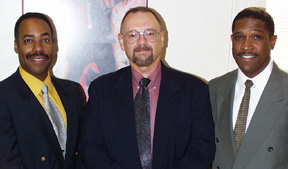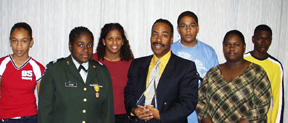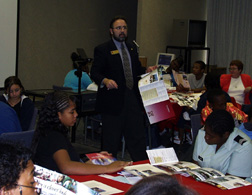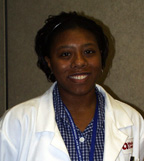 |
Ron King, Ph.D., Thomas Rosenquist, Ph.D., and LeDon Bean. |
Ron G. King, Ph.D., is one of the highest-ranking African-Americans at the National Human Genome Research Institute, National Institutes of Health (NIH). He is director of training and development and associate scientific director for the division of intramural research at the National Human Genome Research Institute (NHGRI).
Dr. King visited the UNMC campus Sept. 17-18 and met with numerous faculty, including Thomas Rosenquist, Ph.D., vice chancellor for research; toured the Munroe-Meyer Institute Center for Human Molecular Genetics; and was honored at a dinner hosted by the Great Plains National Medical Association, whose president is Kristie Hayes, M.D., chief of dermatology section of UNMC’s department of internal medicine.
But that’s not why he came to Omaha.
Dr. King came to Omaha for one specific reason — to support the fourth annual minority youth education program created by LeDon Bean, a doctoral candidate in UNMC’s department of pharmacology, and sponsored by UNMC’s Office of Student Equity and Multicultural Affairs. On Sept. 18, Dr. King spoke to 65 African American students from Monroe Middle School and North and Central High Schools who participated in an all-day health science professions workshop titled, “Stepping Forward and Reaching Back: Education, Keys to Success.”
Dr. King: “We have a responsibility”
“I took time from my busy schedule and flew halfway across the country to Omaha — my own expense — for the same reason that LeDon Bean and others worked so hard to develop this special enrichment program for minority kids,” Dr. King said. “I, too, was raised to believe that we have a responsibility to our community to reach back to the next generation, give our talents and guidance to them and never forget where we came from.
 |
Dr. Ron King received an award of appreciation for his “extraordinary kindness” in coming to Omaha. The award was presented on behalf of all the workshop students. From left are Katie Thomas (Monroe), Tawanda Gilmore and Andrea Wilson (Central), Dr. King, Aaron Burse and Rashar Bibbs (North) and Divan Bailey (Monroe). |
“If even one of those 65 kids grows up to be successful in the health sciences, LeDon has done his job. Who knows? The cure for AIDS could be inside one of these Omaha kids. Programs like this need to be encouraged and supported, not only locally, but by people all over the nation. There’s enough media attention on the latest rap star or black celebrity’s 10th Mercedes Benz or mansion. I want to help throw the spotlight on those individuals like LeDon Bean who take it upon themselves to work with local institutions to grow more minority students interested in the health sciences.”
Dr. King finds role model in cartoon
Although Dr. King’s path to becoming a nationally acclaimed scientist began in a segregated black community near San Francisco in the late 1960s, his neighborhood environment was actually quite nurturing for his ambitions. Because of restrictive housing covenants, his community still retained a mass of successful black professionals — lawyers, doctors, dentists and entrepreneurs. Attending college was normal, and even expected, among kids in his neighborhood because their living environment was filled with college-educated people. Kids in the neighborhood grew up believing in academic achievement because of constant adult reinforcement that a specific personal interest or talent meant they were “going to make a fine doctor or a lawyer some day.”
 |
During the workshop, Patrick O’Neill, UNL admissions office and office of financial aid, talks to students about how to find money for college. |
Dr. King’s career
Dr. King received a bachelor’s of arts degree in chemistry with a minor in biochemistry from California State University at Hayward. He received his doctorate in biochemistry with a minor in pharmacology from the University of California at Riverside and Los Angeles. He received postdoctoral training in the department of biochemistry and molecular pharmacology at Merck Sharp and Dohme Research Laboratories. His area of research was in gene regulation and expression of drug metabolizing enzymes.
He joined the Laboratory of Molecular Biology in the National Institute of Neurological Disorders and Stroke as senior staff fellow where he continued to study gene regulation and expression. In 1993, Dr. King joined the National Center for Human Genome Research as the chief of the Technology Transfer Office — an office he created — where he has been responsible for initiating collaborative efforts to develop new technologies in genomic and genetic research.
Dr. King’s responsibilities
Dr. King’s responsibilities in the intramural program include Equal Employment Officer and director of the technology office.
In his role as director of the NHGRI Training and Development Office, Dr. King’s mission is to enhance the training experience of pre- and post-doctoral fellows by serving as a resource for NIH/NHGRI information, mentorship, conflict resolution and problem solving, minority recruitment and grants and fellowships. He also is co-founder of the NIH’s first association of black scientists, a group that is developing more minority research professionals for the NIH and expanding research awareness in the national black community for more scientists and study participants.
Involving the black community
 |
During the workshop, Tiana V. Curry-McCoy, graduate student in the UNMC Biomedical Research Training Program, shared her life experiences with the students. |
“Black American men, for example, have one of the highest incidences of prostate cancer in the world and the highest mortality rate. There’s a possibility that there may be a genetic base that accounts for these numbers. But we’ll never know until we can do the extensive study needed to find out. That means researchers are going to need significant access to the African American population. Now who will have the highest probability of gaining the access, the trust and support of the black community for such a major undertaking? It will be a research study system that has African Americans throughout the whole process as researchers, clinicians, technicians and administrators.
“And where are these individuals going to come from? They are going to come from communities like North Omaha. That is why it’s so vital that we reach black kids early in their education and give them the tools to envision themselves as part of this incredible future ahead. These are the kids who will one day be explaining genetics to their parents in the same way that many young people today are teaching their parents how to use computers. If we don’t catch minority children soon enough, there is a real possibility of future genome divide to equal the digital divide currently existing in many minority communities.”
More about the workshop
The “Stepping Forward and Reaching Back: Education, Keys to Success” workshop included tours of the UNMC campus and a series of presentations about health science careers, college prep academics, admissions and financial aid, and inspirational testimonies from minority students and faculty.
In addition to Dr. King, the speakers included: Mary McNamee, Ph.D., R.N., director of the Office of Student Equity and Multicultural Affairs (OSEMA); Sherman Petite, OSEMA staff/outreach retention specialist; Patrick O’Neill, UNL admissions office and office of financial aid; Tiana V. Curry-McCoy, graduate student in the UNMC Biomedical Research Training Program; Lend Frison, director of outpatient services at the Douglas County Health Center; LaKisha Williams, fourth-year medical student; Alfred Harrington M.D., MPH, private practice pediatrician; and John McClain, Ph.D., associate vice chancellor for academic affairs and chief student affairs officer.